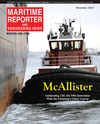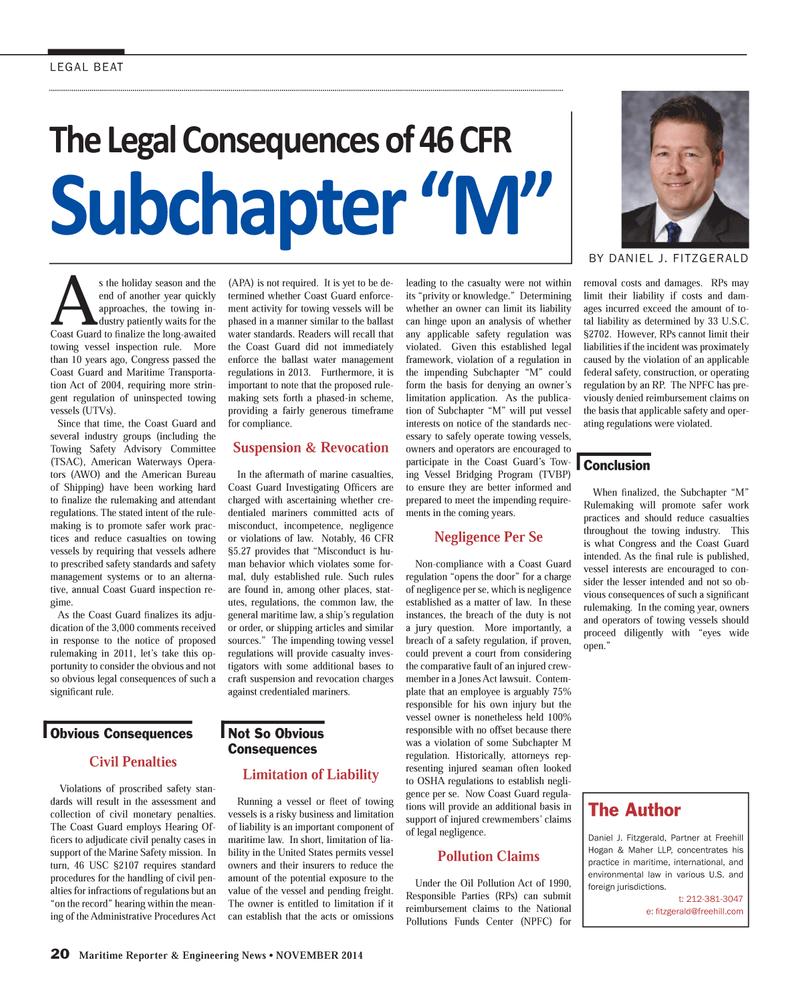
Page 20: of Maritime Reporter Magazine (November 2014)
Workboat Edition
Read this page in Pdf, Flash or Html5 edition of November 2014 Maritime Reporter Magazine
20 Maritime Reporter & Engineering News • NOVEMBER 2014
The Author
Daniel J. Fitzgerald, Partner at Freehill
Hogan & Maher LLP, concentrates his practice in maritime, international, and environmental law in various U.S. and foreign jurisdictions. t: 212-381-3047 e: fi [email protected]
LEGAL BEAT
A s the holiday season and the end of another year quickly approaches, the towing in- dustry patiently waits for the
Coast Guard to ? nalize the long-awaited towing vessel inspection rule. More than 10 years ago, Congress passed the
Coast Guard and Maritime Transporta- tion Act of 2004, requiring more strin- gent regulation of uninspected towing vessels (UTVs).
Since that time, the Coast Guard and several industry groups (including the
Towing Safety Advisory Committee (TSAC), American Waterways Opera- tors (AWO) and the American Bureau of Shipping) have been working hard to ? nalize the rulemaking and attendant regulations. The stated intent of the rule- making is to promote safer work prac- tices and reduce casualties on towing vessels by requiring that vessels adhere to prescribed safety standards and safety management systems or to an alterna- tive, annual Coast Guard inspection re- gime.
As the Coast Guard ? nalizes its adju- dication of the 3,000 comments received in response to the notice of proposed rulemaking in 2011, let’s take this op- portunity to consider the obvious and not so obvious legal consequences of such a signi? cant rule.
Obvious Consequences
Civil Penalties
Violations of proscribed safety stan- dards will result in the assessment and collection of civil monetary penalties.
The Coast Guard employs Hearing Of- ? cers to adjudicate civil penalty cases in support of the Marine Safety mission. In turn, 46 USC §2107 requires standard procedures for the handling of civil pen- alties for infractions of regulations but an “on the record” hearing within the mean- ing of the Administrative Procedures Act (APA) is not required. It is yet to be de- termined whether Coast Guard enforce- ment activity for towing vessels will be phased in a manner similar to the ballast water standards. Readers will recall that the Coast Guard did not immediately enforce the ballast water management regulations in 2013. Furthermore, it is important to note that the proposed rule- making sets forth a phased-in scheme, providing a fairly generous timeframe for compliance.
Suspension & Revocation
In the aftermath of marine casualties,
Coast Guard Investigating Of? cers are charged with ascertaining whether cre- dentialed mariners committed acts of misconduct, incompetence, negligence or violations of law. Notably, 46 CFR §5.27 provides that “Misconduct is hu- man behavior which violates some for- mal, duly established rule. Such rules are found in, among other places, stat- utes, regulations, the common law, the general maritime law, a ship’s regulation or order, or shipping articles and similar sources.” The impending towing vessel regulations will provide casualty inves- tigators with some additional bases to craft suspension and revocation charges against credentialed mariners.
Not So Obvious
Consequences
Limitation of Liability
Running a vessel or ? eet of towing vessels is a risky business and limitation of liability is an important component of maritime law. In short, limitation of lia- bility in the United States permits vessel owners and their insurers to reduce the amount of the potential exposure to the value of the vessel and pending freight.
The owner is entitled to limitation if it can establish that the acts or omissions leading to the casualty were not within its “privity or knowledge.” Determining whether an owner can limit its liability can hinge upon an analysis of whether any applicable safety regulation was violated. Given this established legal framework, violation of a regulation in the impending Subchapter “M” could form the basis for denying an owner’s limitation application. As the publica- tion of Subchapter “M” will put vessel interests on notice of the standards nec- essary to safely operate towing vessels, owners and operators are encouraged to participate in the Coast Guard’s Tow- ing Vessel Bridging Program (TVBP) to ensure they are better informed and prepared to meet the impending require- ments in the coming years.
Negligence Per Se
Non-compliance with a Coast Guard regulation “opens the door” for a charge of negligence per se, which is negligence established as a matter of law. In these instances, the breach of the duty is not a jury question. More importantly, a breach of a safety regulation, if proven, could prevent a court from considering the comparative fault of an injured crew- member in a Jones Act lawsuit. Contem- plate that an employee is arguably 75% responsible for his own injury but the vessel owner is nonetheless held 100% responsible with no offset because there was a violation of some Subchapter M regulation. Historically, attorneys rep- resenting injured seaman often looked to OSHA regulations to establish negli- gence per se. Now Coast Guard regula- tions will provide an additional basis in support of injured crewmembers’ claims of legal negligence.
Pollution Claims
Under the Oil Pollution Act of 1990,
Responsible Parties (RPs) can submit reimbursement claims to the National
Pollutions Funds Center (NPFC) for removal costs and damages. RPs may limit their liability if costs and dam- ages incurred exceed the amount of to- tal liability as determined by 33 U.S.C. §2702. However, RPs cannot limit their liabilities if the incident was proximately caused by the violation of an applicable federal safety, construction, or operating regulation by an RP. The NPFC has pre- viously denied reimbursement claims on the basis that applicable safety and oper- ating regulations were violated.
Conclusion
When ? nalized, the Subchapter “M”
Rulemaking will promote safer work practices and should reduce casualties throughout the towing industry. This is what Congress and the Coast Guard intended. As the ? nal rule is published, vessel interests are encouraged to con- sider the lesser intended and not so ob- vious consequences of such a signi? cant rulemaking. In the coming year, owners and operators of towing vessels should proceed diligently with “eyes wide open.”
The Legal Consequences of 46 CFR
Subchapter “M”
BY DANIEL J. FITZGERALD
MR #11 (18-25).indd 20 10/31/2014 10:05:29 AM

 19
19

 21
21
